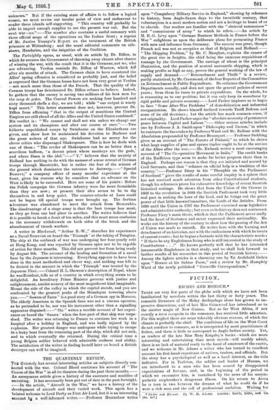THE QUARTERLY REVIEW.
Tug Qmarterly has several interesting articles on subjects directly con- nected with the war. Colonel Blood continues his account of " The Course of the War" in all its theatres during the past three months.— An anonymous article gives a history of the successes and muddles of recruiting. It has necessarily been put out of date in the past fortnight. —In the article; " Aircraft in the War," we have a history of the development of aircraft and their varied work. This again has a belated welcome to Lord Derby as First Air Lord, but it is an interesting account bir a well-informed writer.—Professor Hearnshaw writes
upon " Compulsory Military Service in England," showing by reference to history, from Anglo-Saxon days to the twentieth' century, that voluntaryism is a most modern notion and not a heritage to boast of or to cherish. Our readers are familiar with the " shrieval summonses" and " commissions of array " to which he refers.--An article by M. R.-G. Levy upon " German Business Methods in France before the War" enlightens us upon the deliberate plans for permeating Franco with men and influence from Germany. The success was great, though French soil was not so receptive as that of Belgium and Holland.- " The Shipping Problem," by Mr. C. Maughan, explains the causes of the great rise in freights, the chief being the immense requisitions of tonnage by the Government. The carriage of wheat is the principal illustration, and the position of neutral mercantile shipping, which is making profits as high as any, proves the general working of the law cf supply and demand.—" Retrenchment and Thrift " is a review, partly statistical, by Mr. Crammond, of the four Reports of the Committee on Retrenchment in Public Expenditure. He criticizes the Government Departments soundly, and does not spare the general policies of recent years ; from them he turns to private expenditure. On the whole, he is reassuring as to our position; but it can only keep its soundness by rigid public and private economy.—Lord Parker implores us to begin to face " Some After-War Problems " of demobilization and industrial reorganization. He shows himself inclined towards Tariff Reform and some of its old doctrines ; but the article has much common-sense, 'if not originality. Lord Parker urges the " absolute necessity of permanent peace between Capital and Labour."—Other serious articles include one by Professor J. A. Smith upon" Philosophy and Theism," in which he contrasts the lines taken by Professor Ward and Mr. Balfour with the Absolutism propounded by Professor Besanquet.—Professor Stabbing gives us an account of " The Forests of Finland," in which he shOws what large supplies of pine and spruce timber ought to be at the service of the Allies after the war.—Mr. Ewbank writes a most encouraging account of " The Co-operative Movement in India." The credit banks of the Raiffeisen type seem to make far better progress there than in England. Perhaps one reason is that they are initiated and nursed by Civil Servants, and that " reliance on official help is a tradition of tho country."—Professor Dicey in his " Thoughts on the Parliament of Scotland" gives the results of some careful inquiry in a sphere that has not received much attention from other Constitutional students, though his references prove his exhaustive knowledge of recent Scottish historical writings. He shows that from the Union of the Crowns in 1603 to the revolution in 1689 the Scottish Parliament took very little real part in making the laws of the land, and he brings out the great power of that little-known Committee, the Lords of the Articles. From 1090 until the Union in 1707 the Parliament exercised more legislative and administrative authority; but even so its history does not controvert Professor Dicey's main thesis, which is that the Parliament never really had the heart of Scotsmen and never expressed their nationality. Ho works out the history of the century to show how the passing of the Act of Union was made so smooth. He writes hero with the learning and detachment of an historian, not with the enthusiasm with which he treats of current events ; but he begins a footnote with the characteristic words " If there be any Englishman living who is still interested in the study of Constitutions - . ." Ho knows perfectly well that he has interested innumerable Englishmen in that study, and we shall look forward to further results of his researches in this period of Scottish history.— Among the lighter articles is a charming one by Sir Archibald Geikie upon " Horace at his Sabine Farm," and a review by Mr. Humphry Ward of the newly published " Granville Correspondence."






























 Previous page
Previous page